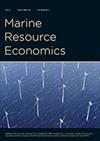MPAs and Aspatial Policies in Artisanal Fisheries
IF 1.7
3区 经济学
Q2 ECONOMICS
引用次数: 2
Abstract
Using a spatially explicit framework with low/middle-income country coastal characteristics, we explore whether aspatial policies augment the impact of marine protected areas (MPAs) and identify when MPAs create income burdens on communities. When MPAs are small and budget-constrained, they cannot resolve all of the marinescape’s open-access issues, but they can create win-win opportunities for ecological and economic goals at lower levels of enforcement. Aspatial policies—taxes, gear restrictions, license restrictions, and livelihood programs—improve the MPA’s ability to generate ecological gains, and licenses and livelihood policies can mitigate MPA-induced income burdens. Managers can use MPA location and enforcement level, in conjunction with the MPA’s impact on fish dispersal, to induce exit from fishing and to direct the spatial leakage of effort. Our framework provides further insights for conservation-development policy in coastal settings, and we explore stylized examples in Costa Rica and Tanzania.MPAs与个体渔业的天冬氨酸政策
利用具有中低收入国家沿海特征的空间明确框架,我们探讨了空间政策是否会增加海洋保护区(MPAs)的影响,并确定MPAs何时会给社区带来收入负担。当海洋保护区规模较小且预算有限时,它们无法解决所有海洋保护区的开放问题,但它们可以在较低的执法水平上为生态和经济目标创造双赢的机会。空间政策——税收、齿轮限制、许可证限制和生计计划——提高了海洋保护区产生生态效益的能力,许可证和生计政策可以减轻海洋保护区造成的收入负担。管理者可以利用保护区的位置和执法水平,结合保护区对鱼类扩散的影响,诱导人们退出捕鱼,并指导努力的空间泄漏。我们的框架为沿海地区的保护发展政策提供了进一步的见解,我们探索了哥斯达黎加和坦桑尼亚的风格化例子。
本文章由计算机程序翻译,如有差异,请以英文原文为准。
求助全文
约1分钟内获得全文
求助全文
来源期刊

Marine Resource Economics
农林科学-渔业
CiteScore
4.30
自引率
10.30%
发文量
25
审稿时长
>12 weeks
期刊介绍:
Marine Resource Economics (MRE) publishes creative and scholarly economic analyses of a range of issues related to natural resource use in the global marine environment. The scope of the journal includes conceptual and empirical investigations aimed at addressing real-world oceans and coastal policy problems. Examples include studies of fisheries, aquaculture, seafood marketing and trade, marine biodiversity, marine and coastal recreation, marine pollution, offshore oil and gas, seabed mining, renewable ocean energy sources, marine transportation, coastal land use and climate adaptation, and management of estuaries and watersheds.
 求助内容:
求助内容: 应助结果提醒方式:
应助结果提醒方式:


